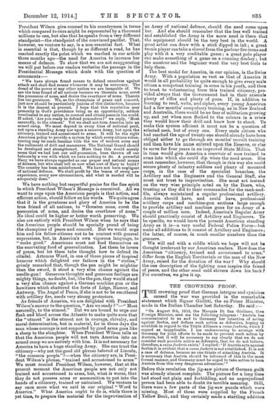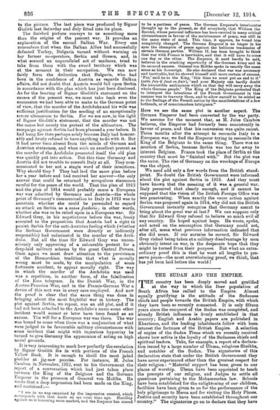THE CROWNING PROOF. T HE crowning proof that German intrigue and
cynicism caused the war was provided in the remarkable statement which Signor Giolitti, the ex-Prime Minister, made in the Italian Chamber last Saturday. He said :- " Oa August 9th, 1913, the Marquis Di San Giuliano, then Foreign Minister, sent me the following telegram : Austria has communicated to us and to Germany her intention of acting against Serbia, and defines such action as defensive, hoping to establish in regard to the Triple Alliance a casus foederis, which I regard as inapplicable. I am endeavouring to arrange with Germany for joint efforts to be made to prevent such action by Austria, but it will be necessary to say clearly that we do not consider such possible action as defensive, that we do not believe, therefore, a casus foederis exists.' I replied : If Austria acts against Serbia it is evident that a casus foederis is not established. It is not a case of defence, because no one thinks of attacking Austria. It is necessary that Austria should be informed of this in the most formal manner, and Germany must be urged to take action to turn Austria from this very dangerous adventure.' " Before this revelation the jig-saw picture of German guilt was already almost complete. The picture for a long time had stood out plain and forbidding, and no unprejudiced. person had been able to doubt its terrible meaning. Still, there were a few parts of the jig-saw puzzle which were missing. Most of these were supplied by the French Yellow Book, and they certainly made a startling addition to the picture. The last piece was produced by Signor Giolitti last Saturday and duly fitted into its place.
The finished picture conveys to us something more than the origins of the present war. It provides an explanation of the second Balkan War. Every one remembers that when the Balkan Allies had successfully defeated Turkey, Bulgaria turned without warning on her former co-operators, Serbia and Greece, and, in what seemed an unparalleled act of madness, tried to take from them with the sword territory which was
at the moment in their occupation. We can now fairly form the deduction that Bulgaria, who had been in the confidence of Austria as regards Balkan affairs, did not doubt that Austria would fall upon Serbia in accordance with the plan which has just been disclosed. As for the bearing of Signor Giolitti's statement on the causes of the present war, we must take back even the concession we had been able to make to the German point of view, that the murder of the Archduke and his wife was sufficient justification for the sending of an exceptionally revere ultimatum to Serbia. For we see now, in the light of Signor Giolitti's statement, that the murder was not the cause but merely the pretext of the ultimatum. The campaign against Serbia had been planned a year before. It had hung fire then perhaps solely because Italy had honour- ably and firmly refused to have anything to do with it. But it had never been absent from the minds of German and Austrian statesmen, and when such an excellent pretext as the murder of the Archduke presented itself the old plan was quickly put into action. But this time Germany and Austria did not trouble to consult Italy at all. They com- municated to her not a single word of their intentions. Why should they ? They had laid the same plan before her a year before and had received her answer—the only answer that could be returned by scrupulous statesmen careful for the peace of the world. That the plan of 1913 and the plan of 1914 would probably cause a European war was admitted by Germany and Austria—the whole point of Germany's communication to Italy in 1913 was to ascertain whether she could be persuaded to regard an attack on Serbia as a casus foederis ; in other words, whether she was to be relied upon in a European war. Sir Edward Grey, in his negotiations before the war, freely assented to the proposition that Austria had a right to punish Serbia for the anti-Austrian feeling which (whether the Serbian Government were directly or indirectly responsible) had culminated in the murder of the Arch- duke. But all the time Sir Edward Grey was uncon- sciously only approving of a colourable pretext for a deep-laid military scheme by the great Central Powers. Once again we must draw attention to the persistence of the Bistnarckian tradition that what is morally wrong must be made, by the manipulation of some fortunate accident, to appear morally right. The way in which the murder of the Archduke was used was a repetition, in another form, of the falsification of the Ems telegram. In the Danish War, in the Austro-Prussian War, and in the Franco-German War a device of this sort was in every case employed. And now the proof is clear that the same thing was done in bringing about the most frightful war in history. The plot against Serbia, we repeat, was an old plot, and if it had not been attached to the Archduke's name some other incident would sooner or later have been found as an excuse. The will for a European war was there. The war was bound to come when there was a conjunction of what were judged to be favourable military circumstances with some incident that might with ingenious hypocrisy be turned to give Germany the appearance of acting on high moral grounds.
It is very interesting to mark how perfectly the revelation by Signor Giolitti fits in with portions of the French Yellow Book. It is enough to thrill the most jaded plodder at jig-saw puzzles. For instance, M. Jules Cambon in November, 1913, sent to his Government the report of a conversation which had just taken place between the King of the Belgians and the German Emperor in the presence of General von Moltke. He wrote that a deep impression had been made on the King, and continued
" I am in no way surprised by the impression created, which corresponds with that made on me some timo ago. Hostility against us is becoming more marked, and the Emperor has ceased to be a partisan of peace. The German Emperor's interlocutor thought up to the present, as did everybody, that William the Second, whose personal influence has been exerted in many critical circumstances in favour of the maintenance of peace, was still in the same state of mind. This time, it appears, he found him completely changed. The German Emperor is no longer in his eyes the champion of peace against the bellicose tendencies of certain German parties. William II. has been brought to think that war with France is inevitable, and that it will have to come one day or the other. The Emperor, it need hardly be said, believes in the crushing superiority of the German Army and in its assured success. General von Moltke spoke in exactly the same sense as his Sovereign. He also declared that war was necessary and inevitable, but he showed himself still more certain of success. For,' said he to the King, this time we must put an end to it' (cette fois it taut en finir), `and your Majesty can hardly doubt the irresistible enthusiasm which on that day will carry away the whole German people.' The King of the Belgians protested that to interpret the intentions of the French Government in this manner was to travesty them, and to allow oneself to be misled as to the feelings of the French nation by the manifestations of a few hotheads, or of conscienceless intriguers."
Here we see the same plot in another aspect. The German Emperor had been converted by the war party. We assume for the moment that, as M. Jules Cambon believes, the Emperor had formerly been consistently in favour of peace, and that his conversion was quite recent. Three months after the attempt to reconcile Italy to a European war, we find the Emperor trying to reconcile the King of the Belgians to the same thing. There was no mention of Serbia, because Serbia was too far away to interest Belgium. France took the place of Serbia as the
country that must be "finished with." But the plot was the same. The rise of Germany on the wreckage of Europe was the object.
We need add only a few words from the British stand- point. No doubt the British Government were informed about the plot against Serbia in 1913. And they must have known that the meaning of it was a general war. Italy perceived that clearly enough, and it cannot be supposed that the vision of the British Foreign Office was less penetrating. When exactly the same action against Serbia was proposed again in 1914, why did not the British Government instantly recognize that Germany meant to bring about the great war at last ? We can suppose only that Sir Edward Grey refused to believe so much evil of any country. He hoped against hope. He wrote, spoke, and acted on the assumption that Germany could not, after all, mean what previous information indicated that she did mean. If our surmise be correct, Sir Edward Grey risked being taken at a military disadvantage by men obviously intent on war, in the desperate hope that they might be turned from their purpose. But what an extra- ordinary proof this is that he went all lengths to pre- serve peace—the most overwhelming proof, we think, that has yet been laid before the world !















































 Previous page
Previous page